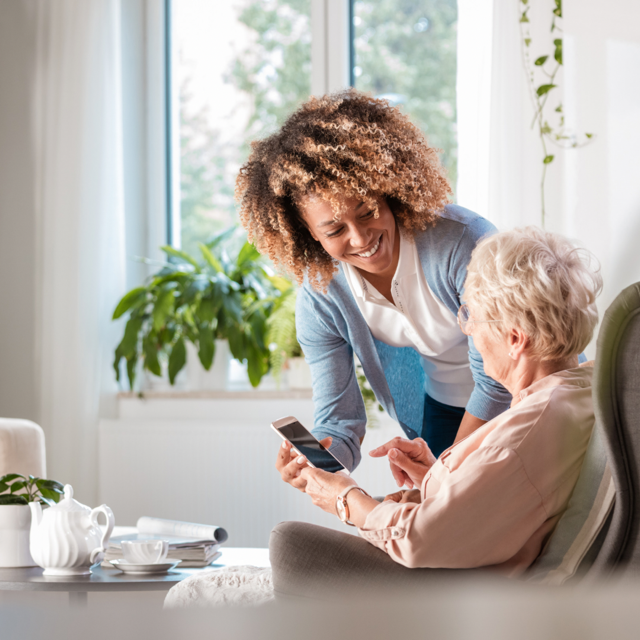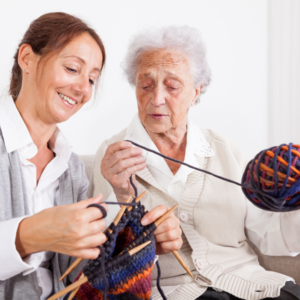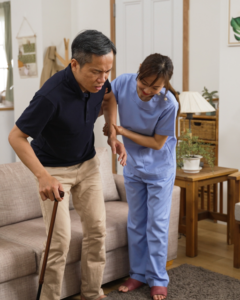4 Essential Measures To Prevent Dementia-Related Safety Issues
Caring for someone with dementia is a significant challenge in handling the possibility of their wandering away and being lost. It’s critical to understand that their behaviors aren’t just mindless roaming; there’s usually a reason behind them. They may be looking for something or someone, believing they have a special task, or attempting to meet a basic need such as hunger or compassion. Their communication difficulties might make it challenging to grasp their objectives.
There have been reports of people with dementia wandering away from their homes and becoming lost. There are, however, techniques for reducing these dangers and
improving overall safety.
Alert Systems for Enhanced Safety
A number of innovative gadgets and technologies are available to safeguard the safety of people with dementia and prevent them from leaving their homes unobserved. These cutting-edge gadgets provide reassurance and peace of mind to both carers and individuals receiving care.
Audio and video monitors are one type of solution, with video monitors providing the extra benefit of visual monitoring from another room. Placing motion-sensor alarms near commonly used doors can also be quite helpful in alerting you to any attempted escapes. Stick-on door chime alarms serve as an alert device by providing a useful audio indication when a door is opened.
There are also dementia-specific technologies, such as waterproof patches with transmitters that send alarms if the user goes too far away, making them perfect for outdoor activities. Consider installing motion-sensor lights beneath the bed or in corridors to highlight the individual’s route if they wake up during the night, lowering the danger of accidents.
Creating Safe Passageways for Seniors
For the protection of people with dementia, you should strengthen your home’s access and departure points in addition to implementing technological assistance. A variety of measures may be used to improve security in these areas. Door-lever safety locks, for example, need a certain action to open, making them difficult for people with dementia but doable for carers. Doorknob safety coverings surround doorknobs to prevent them from being easily gripped and turned, while deadbolt locks set above or below eye level can make departure points less visible.
Other alternatives include the placement of door guards, which provide a controllable barrier to prevent unauthorized escapes, and the use of door-size posters that brilliantly simulate bookshelves or brick walls, deterring those with dementia from attempting to exit. It is critical to have a secure emergency exit while taking these procedures. Assure that such an exit is well-lit, unobstructed, and easily accessible, ensuring a safe evacuation path in the event of an emergency. These procedures, when combined with technological solutions, form a comprehensive safety net that provides peace of mind to both carers and people in their care.
Tracking Seniors: GPS and Identification Aids
To ensure your loved ones with dementia are secure, make sure they have some kind of identification that contains emergency contact numbers and reveals their dementia diagnosis. ID bracelets, pendants, or tags that may be affixed to shoelaces or watchbands can all be used for identification. Consider putting identification within their clothing and on their mobile phones, as they are easily available to others in the event of an emergency. Keeping updated images of your loved ones is also a good idea, since these may help with search efforts if the need arises.
Installing GPS monitoring applications on cellphones is a wise move for those who own them. You might also consider attaching tracking devices to other personal things such as clothing, keys, wallets, automobiles, or shoe bottoms. These gadgets can help track a person’s movements. Consider medical alert systems with GPS functionality, which provide both emergency aid and tracking capabilities. Carers may considerably improve the safety and security of dementia patients by applying these steps.
Driving Evaluation for Seniors
Individuals with dementia should have their driving abilities closely monitored since their judgement, eyesight, and navigational skills may decrease. Consult with their doctor and look into alternate transportation choices, as losing their driving privileges may impair their sense of freedom. Make sure you have backup transportation plans in place. For increased protection, some carers secure car keys or remove vehicles from their access while deploying GPS trackers.
Individuals with dementia may attempt to operate other vehicles such as bicycles, tractors, or golf carts, so keep an eye on their accessibility. Assess their abilities to operate these vehicles safely on a regular basis and, if required, restrict access. As dementia advances, safety problems may emerge, so it’s critical to constantly assess the danger of your loved ones becoming separated or hurt. Create a detailed strategy for dealing with such circumstances, which should include contacting authorities, friends, and family.
How caregivers can assist or help seniors with dementia?
Caregivers may help elders with dementia by offering a disciplined schedule, clear communication, and memory assistance. A constant daily plan, simple language, and memory aids such as calendars and labelled containers can help elders feel comfortable and organized. Carers should also keep a close watch on safety, especially for seniors who are prone to wandering or have difficulty with specific chores. This includes support with prescription administration, personal care, and meal preparation, providing optimal nutrition and cleanliness for elders.
Respite care and getting expert assistance when necessary are critical for both the caregiver’s and the senior’s overall health. To build a comprehensive caring strategy that responds to the individual requirements of each senior with dementia, safety precautions, support groups, and legal and financial preparation should all be addressed. By combining these measures, carers may provide thorough and compassionate care to elders with dementia, improving their quality of life.







